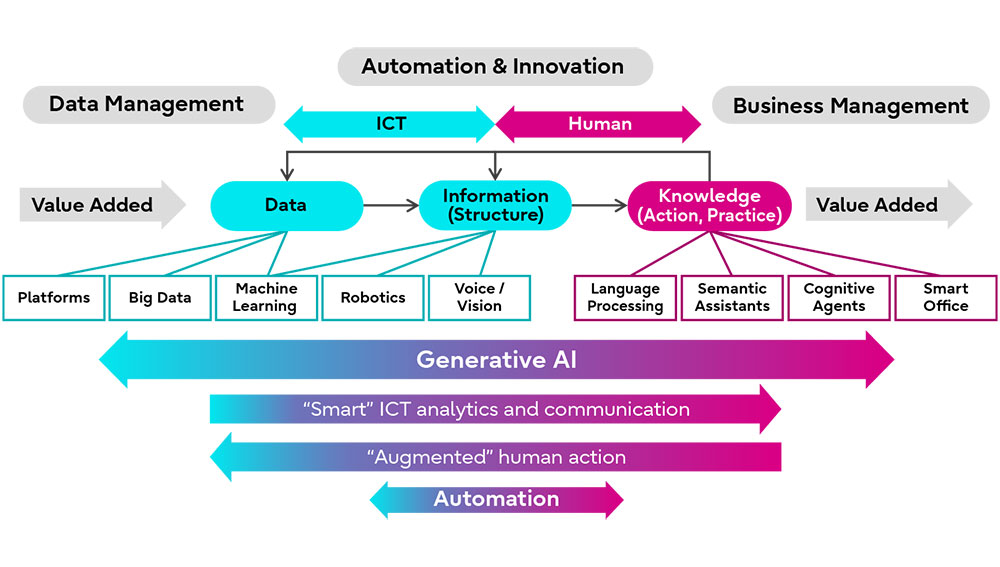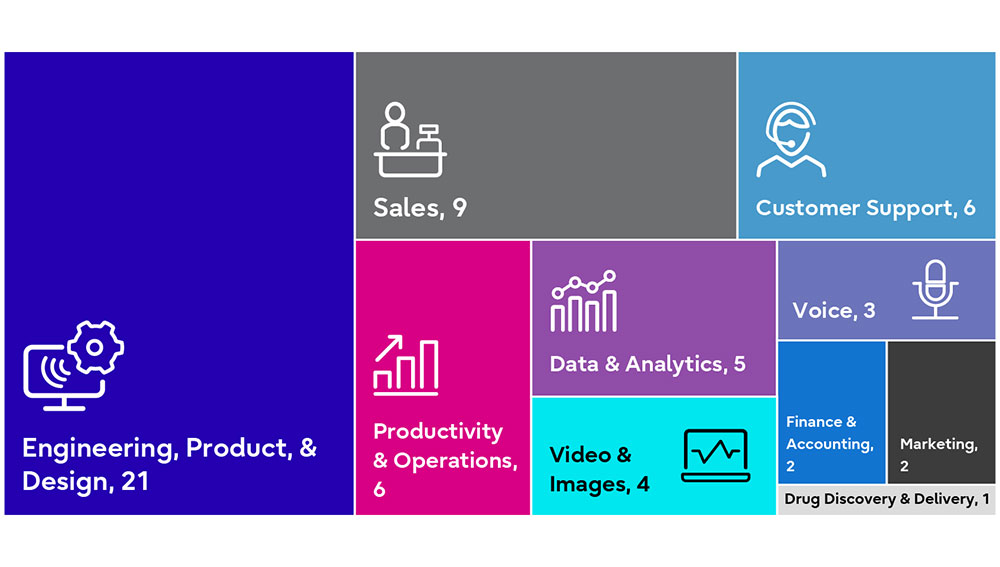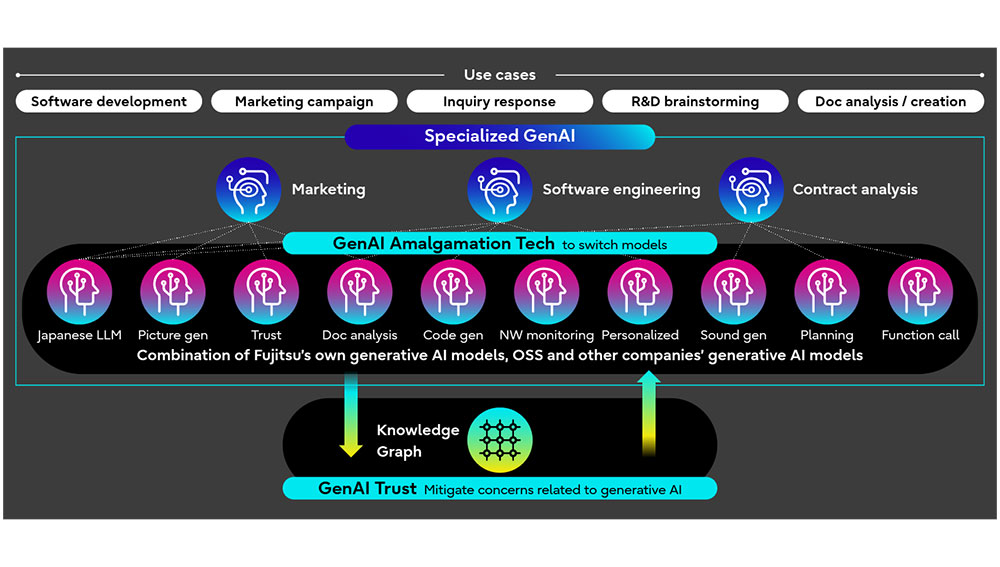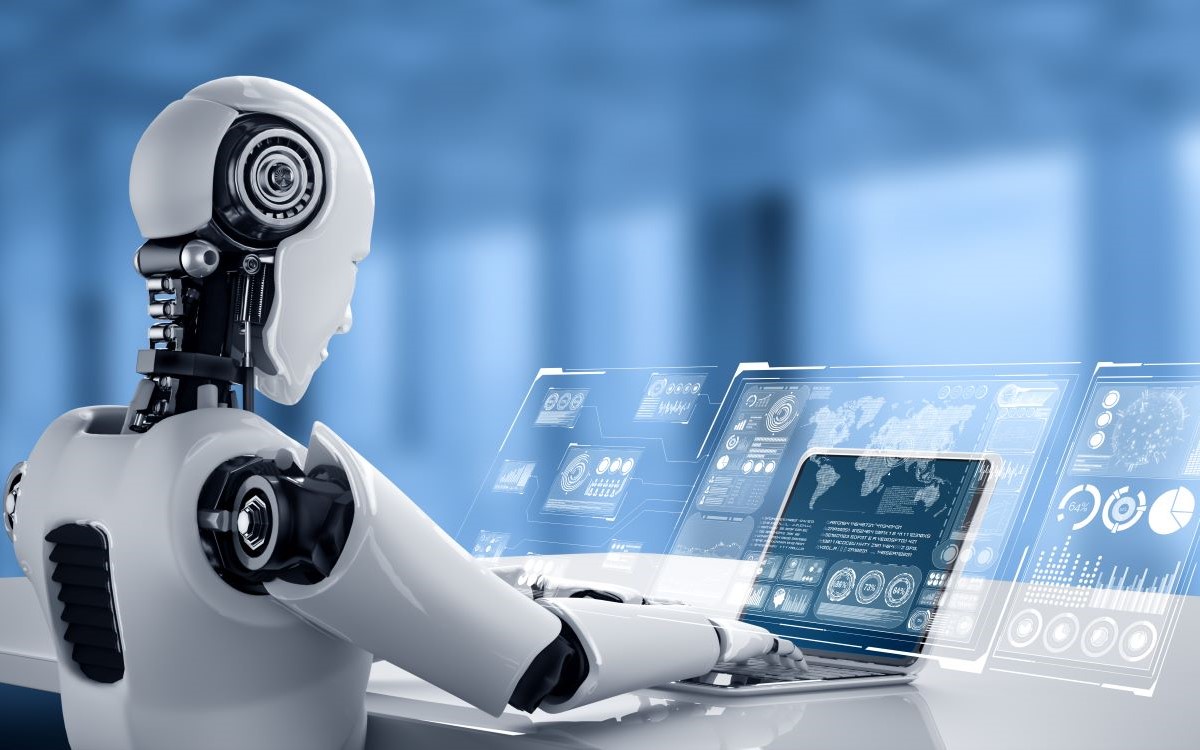Generative AI innovation – Where is the business value?
Fujitsu / April 23, 2024
Companies have begun to explore the most valuable potential of generative AI: supporting business functions through intelligent data organization, process automation, and management support. We analyze these business opportunities from the perspective of some of the most innovative startup companies. This blog post summarizes our findings. For a more in-depth analysis, an overview of the most interesting startup use cases, and how Fujitsu Kozuchi can help you gain a competitive advantage beyond the out-of-the-box capabilities of generative AI, please see our related insight paper.
Contents
- Generative AI Integration into Business Functions
- Startups Drive Generative AI Business Innovation
- Innovative Generative AI Services
- Intelligent Data Management
- R&D and Design
- Intelligent Robotic Process Automation (RPA)
- Intelligent Supply Chains and Logistics
- Marketing, Customer Service, and Sales
- Human Resources, Talent, and Learning
- Conclusion: Innovative Generative AI Integration into Business Services
Generative AI Integration into Business Functions
Generative AI is catalyzing a revolution in human-machine capabilities by bringing the two worlds of data and human management much closer together. Unstructured data, previously scattered across multiple IT systems in documents, data lakes, and a growing flood of internal and social media communications, can now be automatically integrated, analyzed, and communicated to human decision makers without the need for additional IT expertise. Conversely, management communication and decision making can now be more directly translated into digital action.

Generative AI Integration of Data and Human Management
Major platform providers such as Microsoft, AWS and Google are at the forefront of this integration, creating new ecosystems of AI-powered "CoPilots," APIs, and cloud services. These are becoming the foundation of an AI transformation that will enable developers and enterprises to create the next generation of applications, products and services.
Startups Drive Generative AI Business Innovation
It is the dynamic generative AI startup market, however, that is demonstrating the innovative services that can impact business performance and business models before large organizations can integrate them into established business functions. Leading the development of these AI-based business services, is a growing group of “conventional” AI startups that are now adopting generative AI capabilities. These startups are often at the forefront of AI development and very close to their customers. They are now rapidly developing generative AI support for all business functions.

Generative AI Startup Services by Business Function (Y-Combinator 2023)
We have examined new generative AI business service offerings of major (unicorn) and newly funded startup companies internationally. These companies are listed in the Y-Combinator YC Startup Directory and Crunchbase for the US, the European AI Startup Landscape database. For Japan, we created a database of startup companies by combining our FUJITSU ACCELERATOR database with the University of Tokyo Matsuo Labs database and an Internet search for related startups.
Innovative Generative AI Services
The result is a wave of business innovations ranging from data management to effective automation and training to entirely new designs and knowledge management. The chart provides an overview of the potential impact of generative AI on the development of innovative business functions.

Integration of Generative AI into Business Function
Fundamentally, it is the new connection between Data Management and R&D/Design that is fueling innovation across critical business functions. In application, Production & Operations will benefit from the automation enabled by direct access to information both inside and outside the enterprise. As a result, the earlier promise of "Industry 4.0" for a new level of digital connectivity and automation now has an excellent chance of being realized.
Similarly, Supply Chain & Logistic operations will benefit from access to internal and external resources for more flexible operations. Marketing, Customer Management & Sales will experience unprecedented levels of customization and content creation. Finally, HR, Talent & Learning development will redefine how organizations operate and engage their employees in the era of human-machine collaboration.
While it is worth exploring these opportunities and related startup use cases in detail in our Insight paper, the key insights can be summarized as follows.
Intelligent Data Management
In large organizations, “Big Data” management has pulled data out of their organizational silos into "data lakes" or moved them to “the cloud” for integration with external data and better analytics. Generative AI now adds access to unstructured data, such as emails, social media posts, and customer reviews. Generative AI can automatically identify relationships in information and communication across the organization and use them to store additional information. It can continuously update and refine them, ensuring they remain relevant and accurate as new data becomes available. A new form of emerging knowledge base becomes possible, providing individualized answers for each department and business function.
Most importantly, it helps "democratize" access to broad data information and analysis, helping midsize companies develop their own dynamic knowledge bases.
R&D and Design
As advanced data management evolves, researchers are gaining access to a much wider range of information that combines internal data and results with academic sources and public information. Beyond better access to existing information and further customization, however, the greatest impact on applied research comes from supporting data collection through survey development. Past survey results can be immediately integrated into development, and new surveys can be flexibly tested against synthetic data before deployment. New results can be automatically reported and visualized upon arrival. Surveys will soon become more personalized and interactive, and their results will be automatically enriched with non-survey data and linked to responses in product development and customer management.
Generative AI's ability to create 3D designs as easily as (or from) images will have a transformative impact in the future. In architecture, AI has already become a key enabler of complex building designs. Firms are already using generative AI to enhance flexible modeling, customization, and the integration of multiple specifications such as energy efficiency, waste management, and local regulations into new designs. In the future, generative AI designs and actions will become the basis for digital twins and the development of corporate metaverses, as we point out in our Insight Corporate Metaverse – Can it help to prepare for an AI-based digital future?
Intelligent Robotic Process Automation (RPA)
Generative AI's ability to write computer code is one of the fastest developing applications with quantifiable results. According to a McKinsey analysis, the direct impact of AI on software engineering productivity could be 20 to 45 percent of current annual spending on the function. More advanced business process automation is now increasingly being integrated into end-to-end services on cloud platforms.
RPA has become an important part of this evolution as software bots begin to mimic repetitive human input. However, until now, these bots could only work with structured data provided by engineers and were very limited in their actions due to a lack of broader context and judgment capabilities. This is changing. Zoom calls can be automatically summarized, email campaigns can be orchestrated with a few commands, production anomalies can trigger complex maintenance solutions, and predictive maintenance is finally being integrated into production solutions with automatically generated reports and customized dashboards.
Intelligent Supply Chains and Logistics
Supply chains and logistics are still incredibly labor-intensive but rely heavily on technology for reliable information flows and operational efficiency. AI is already supporting many functions, from predicting traffic to efficient routing to organizing warehouses.
However, automation is still limited, and there are still small companies and busy humans between all the nodes who unload trucks, make phone calls for confirmations, send emails for orders, and optimize cost structures. Many "multimodal" administrative tasks, such as coordinating trucking information with routing decisions, carrier schedules, and vehicle maintenance, which have remained too complex and dispersed to solve, could finally be better integrated and automated. Demand forecasting can be customized to individual locations, inventory and logistics can be optimized, procurement can be automated, risk can be managed based on detected anomalies, schedules can be adjusted, and reporting can be focused on the right targets.
Marketing, Customer Service, and Sales
The new generation of chatbots and virtual assistants have the highest immediate potential for benefits in marketing, customer support, and sales. In terms of generative AI potential, personalization topped the list of uses, but insight generation, content creation, and social media integration also played an important role in about half of all use cases.
For individual companies, even greater gains are possible through increased revenue as a result of higher customer satisfaction. This is made possible by democratizing access to valuable customer information and interaction. Until now, only e-commerce and platform companies had direct access to structured customer information in blogs and social media. With generative AI, access to data from different platforms and unstructured sources (blogs, social media, feedback) can now be integrated and automatically analyzed.
Human Resources, Talent, and Learning
Research by Brynjolfsson, Li, and Raymond has shown that generative AI assistants are already increasing productivity in customer support centers by 14% on average. They point out that the AI models could “disseminates the best practices of more able workers and helps newer workers move down the experience curve.” This is critical in aging countries and organizations.
Tasks can be supported with live information and expert guidance to individuals at the point of need. This both increases the productivity of the individual and expands the scope of the personal value proposition to the organization. Onboarding, both internal and external, can become more personalized, and adaptive training programs can be built into job challenges from the start.
Entire training courses can be automatically generated with all relevant assets, including quizzes, polls, and videos, based on intended course descriptions. Virtual reality training programs, including avatar-based storytelling and analysis of learner responses, based on simple learning modules and storyboard descriptions, are already in development.
Conclusion: Innovative Generative AI Integration into Business Services
As companies move beyond the out-of-the-box capabilities of generative AI and begin to explore its potential to for data management and decision making, they will unlock new capabilities in almost every major business function. To facilitate such experimentation, the Fujitsu Group has developed its cloud-based AI platform, Fujitsu Kozuchi.

Fujitsu’s Generative AI “Amalgamation Technology” Integration
While our Insight paper highlights the potential under development at the most innovative startup companies, Fujitsu Kozuchi enables organizations to take full advantage of the leading AI technologies and services from both the open source community and leading commercial vendors to enable effective digital business transformation.
With the Fujitsu Kozuchi AI Platform, Fujitsu and its partners can rapidly explore and co-create generative AI opportunities as they are integrated into their business to create new competitive advantages and maximize new business value.

Related information
Editor's Picks









